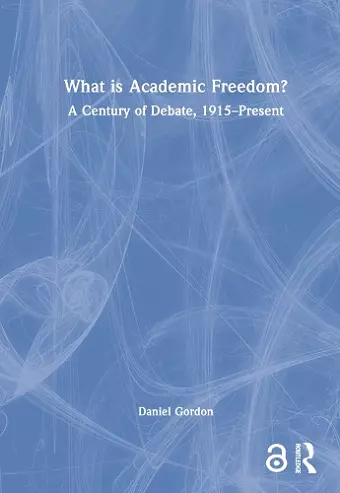What is Academic Freedom?
A Century of Debate, 1915–Present
Format:Hardback
Publisher:Taylor & Francis Ltd
Published:26th Jul '22
Currently unavailable, and unfortunately no date known when it will be back
This hardback is available in another edition too:
- Paperback£37.99(9780367511715)

This book explores the history of the debate, from 1915 to the present, about the meaning of academic freedom, particularly as concerns political activism on the college campus. The book introduces readers to the origins of the modern research university in the United States, the professionalization of the role of the university teacher, and the rise of alternative conceptions of academic freedom challenging the professional model and radicalizing the image of the university. Leading thinkers on the subject of academic freedom—Arthur Lovejoy, Angela Davis, Alexander Meiklejohn, Edward W. Said, among others—spring to life. What is the relationship between freedom of speech and academic freedom? Should communists be allowed to teach? What constitutes unacceptable political "indoctrination" in the classroom? What are the implications for academic freedom of creating Black Studies and Women's Studies departments? Do academic boycotts, such as those directed against Israel, violate the spirit of academic freedom? The book provides the context for these debates. Instead of opining as a judge, the author discloses the legal, philosophical, political, and semantic disagreements in each controversy. The book will appeal to readers across the social sciences and humanities with interests in scholarly freedom and academic life.
The Open Access version of this book, available at www.taylorfrancis.com, has been made available under a Creative Commons Attribution-Non Commercial-No Derivatives 4.0 license.
‘A welcome addition to the rather large library of essays and books on academic freedom, Daniel Gordon’s book departs from the assumption that history is a purifying mechanism in the course of which succeeding generations refine and distil a concept or a program. Gordon offers a much more complex account of academic freedom, telling a multi-faceted story from which ‘academic freedom’ emerges not as a term with a single meaning, but as something of a floating signifier that has meant different things at different times and different things at the same time, depending on social and political circumstances inside and outside of the academy.’ – Stanley Fish, Florida International University, USA
'This is a nuanced account of academic freedom controversies -- from World War I-era disputes over wartime limits on academic expression, to the mid-century debate about whether Communists should be allowed to teach, to the current fracas over BDS and academic boycotts. This book’s combination of strong legal and philosophical analysis with vivid personal profiles (of leading figures such as Arthur Lovejoy, Alexander Meiklejohn, and Angela Davis) makes it an original and thought-provoking contribution to academic freedom studies.' - Nadine Strossen, John Marshall Harlan II Professor of Law, New York Law School, Emerita Former President, American Civil Liberties Union, 1991–2008
'A very smart tour through the people and ideas behind a century of debate over academic freedom.' - Kenneth S. Stern, director of the Bard Center for the Study of Hateand author of 'The Conflict over The Conflict: The Israel/Palestine Campus Debate'
'I thought I was familiar with the history of academic freedom in the United States, but Daniel Gordon's fascinating and lively history taught me that there are complexities within the complexities. I recommend this book for anyone who isn't sure what 'academic freedom' means and has meant-- that is to say, almost everybody.' - Michael Bérubé, Edwin Erle Sparks Professor of Literature, Pennsylvania State University and co-author (with Jennifer Ruth) of 'It's Not Free Speech: Race, Democracy, and the Future of Academic Freedom'
'Daniel Gordon's superb 'What is Academic Freedom?' brings a new level of sophistication to an intensifying debate. At a moment when politicians, activists and even some academics question the ideal of academic freedom, this shrewd and compelling history gives readers a richer understanding of the concept, its past, and its potential future.' John McGreevy, Francis A. McAnaney Professor of History at the University of Notre Dame and author of Catholicism and American Freedom: A History
"Gordon (history, Univ. of Massachusetts, Amherst) endeavors to describe the various ways academic freedom has been interpreted over the last century. The author then explores the idea that academic freedom protects political advocacy in education as not just permissible, but necessary. This book has value as a chronicle of the debate regarding the extent to which politics and academia can be separated."
--S. R. Fitzgerald, University of Massachusetts Amherst, Choice
ISBN: 9780367511708
Dimensions: unknown
Weight: 489g
168 pages